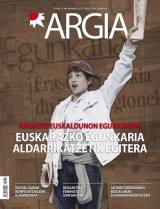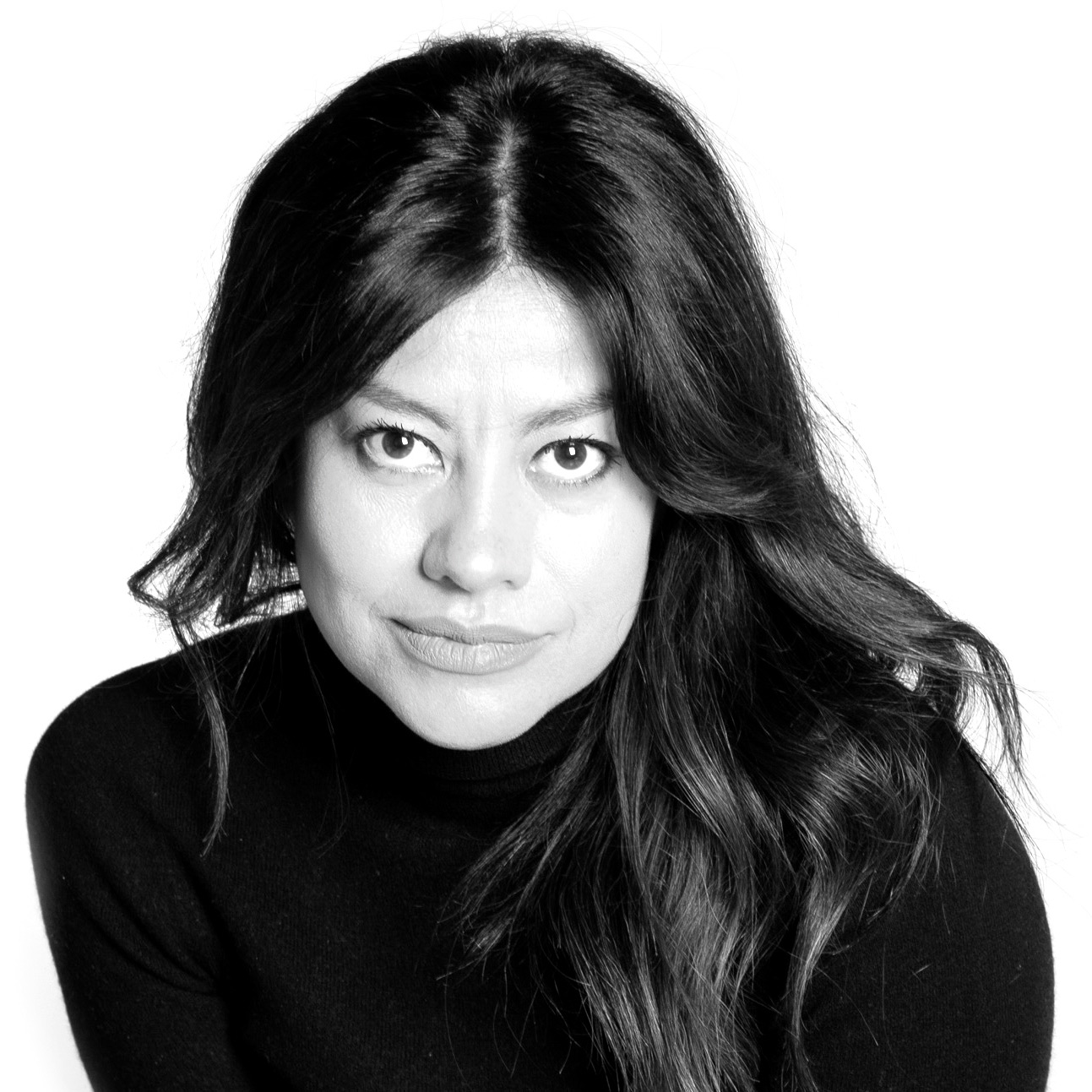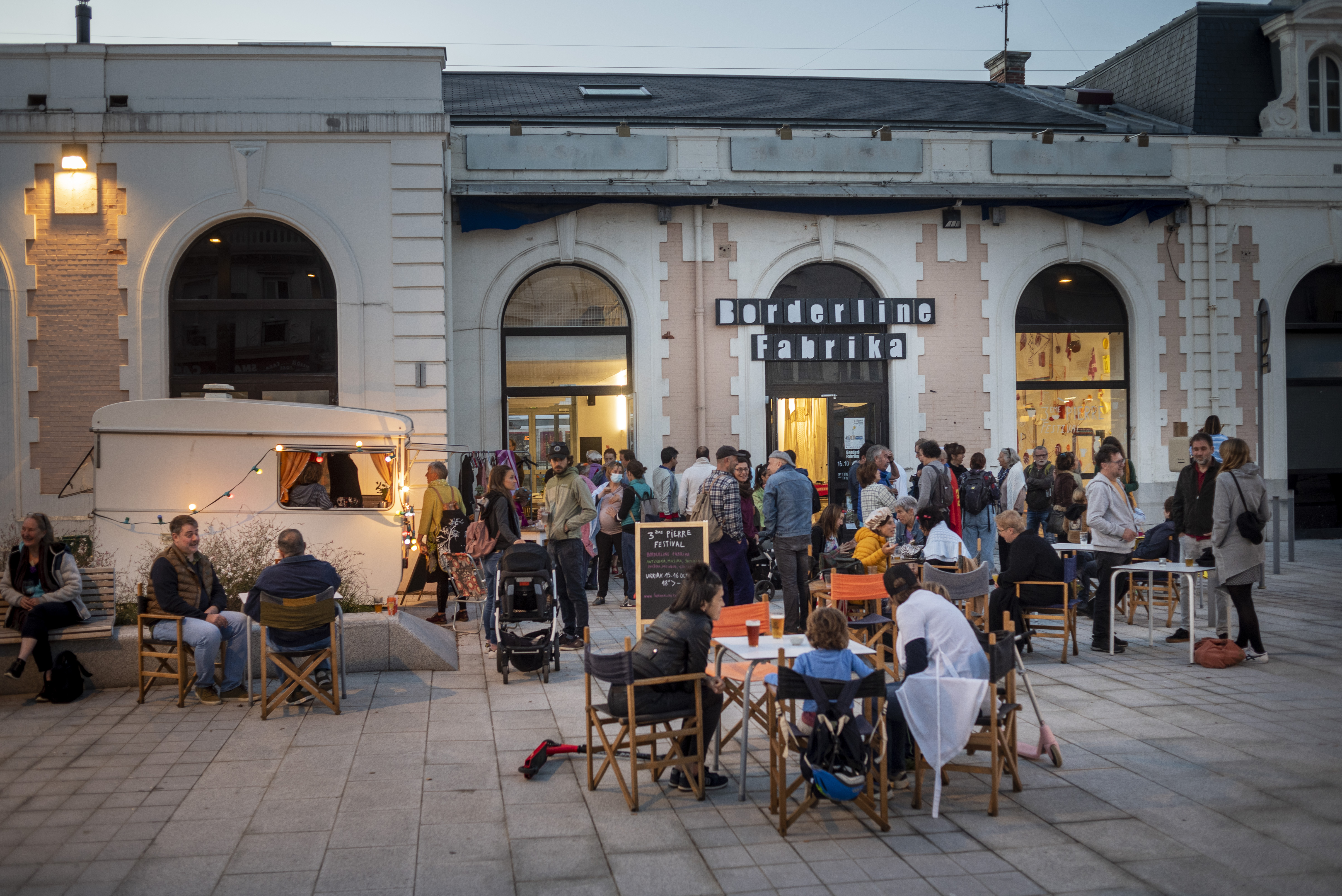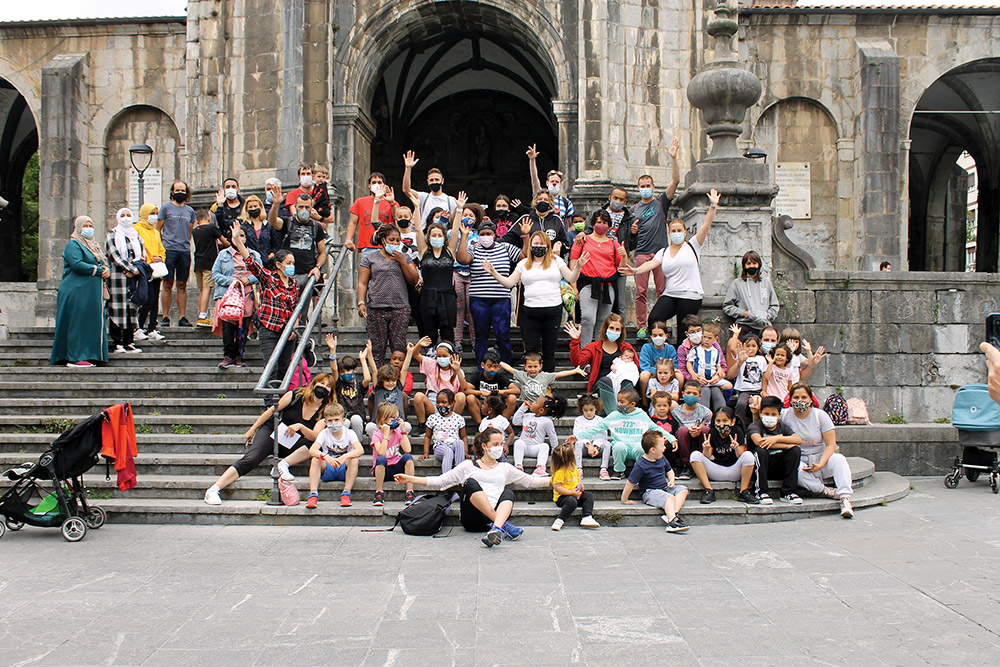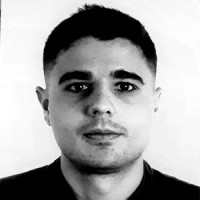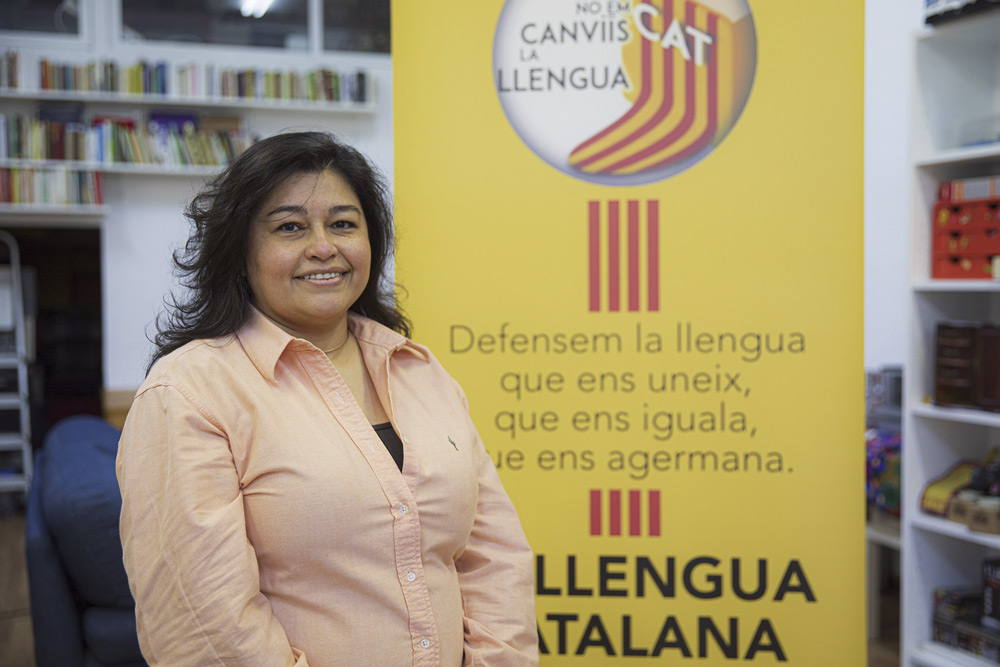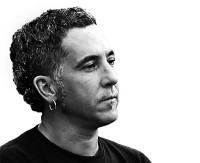First step to meet neighbors
- 428 families have participated in the Bizilagunak project. In order to foster relations between neighbours living in Alboan, but often unknown, meals have been arranged in which born and born in another country have met.
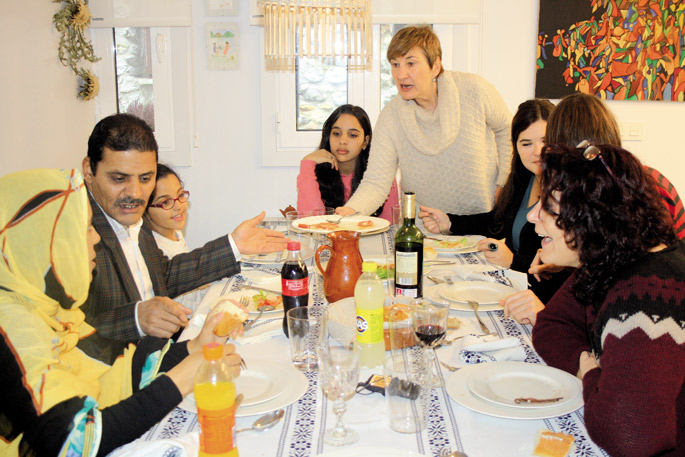
The heat of the house. This was the place chosen by the Bizilagunak project. The homes of many peoples have been able to calm down the fluid words of their unknown neighbours. With the excuse of food, the people born there and the migrants to the Basque Country met in the houses. In total, 2,200 people from 30 nationalities have been cited in 34 localities, out of 214 households. We have approached Hernani: 50 houses have witnessed the talks, and we've been in four of them.
Senegalese Astu, accompanied by Kepa, the food dynamizer, has climbed the staircase to the Ixiar, nervous. The Shi'ites, who have been the first to come, have smiled when they see the door open, but the Hernaniarra has everything prepared. At five minutes the bell of the house has rung again, and other family members have come, all eager to meet Astu. They kissed and sat at the table. Those who know French wanted to show their language skills to the guest, to whom they felt at home. At 23 years old, he has been in the Basque Country for four months, and he has been asked if Senegal alone has come, and he has answered yes. He is embarrassed, but the closeness of those around him seems to reassure him. They talk about food and slowly begin to explain it. It seems that the objective of the project is being met, as information about the experiences and lives of others is gradually being shared.
Something similar has also happened in the house of Coro. When we arrived, we observed that everyone laughed out loud. In this case, two families have gathered, one from the Sahara and another from Hernani’s “special family”: parents Fatu and Cheij with their daughters Guha and Matu and their companions Koro, Xabi and Ixa. The eldest daughter, Matu, has made cake for food, and they have also brought a drink called bissam to celebrate the special day. They have been living in Hernani for two years, and about five in Euskal Herria. In food everyone seems to be at ease; today they have met, although they have crossed in the village, the project has given them the opportunity to cross their first words. The daughters speak in Basque, the oldest knows four languages and wants to be a doctor, that's what he told the new friends. It is not the first time that the Saharawi family has participated in the Bizilagunak programme, they have explained to us that they feel as comfortable as the previous one: “This program helps to strengthen coexistence between Basques and migrants of birth, and that is very important to us. It makes it easier for us to know their customs and, above all, the local people, and that is terrible.” The daughters are also at ease, as well as taking the gifts home. She has also been the daughter of Ixa at the beginning of the meal, and we have been told that a nice relationship has emerged among the youngest: “Children are often the key, they teach us that we are all equal and that prejudices are worthless, they make us see that we have to break these prejudices.” It's Ane's words. It energizes food and tells us that the aim of the initiative is to normalize the relationship between people living in the same people: “All of them are, in this case, Hernaniards, and the best opportunity to know each other is to open the doors of the house.”
Diversity, the most valuable treasure
In all meals there is a dynamism to offer help. But Ane has stressed that it's an easy task, that most of the time they don't need them, because the two sides know where and what they're going, and because they both demonstrate their honesty from the very beginning: “Diversity is the great exponent of these days, as in addition to gathering people with different cultures or customs, we also come together with different types of families; it may be friends, companions or relatives who come to know the neighbors”. In this case, Hernaniarras are co-workers, but they say there is also a family: “That plurality really shows the intent of all this.”
Another family has also gathered in Eli's house: his neighbor, his parents and a family that has migrated to Hernani. What are you talking about? Football. One is in favour of Real Madrid, and then no, jokingly. He is certainly a supporter of the Catalan teams. They're in humor. Then we've been told that they've gone through the conversation by putting the tape recorder, that they don't like football too much. Then the time begins to tell jokes; first the children, then the mother. Eli says it's really bad to tell jokes, so today he's had to laugh. But it has also had another task, as it has risen from the table and started to take pictures; it can be an unforgettable meal, they can be the first examples of a relationship and wants to keep the moment between the flash. They have continued to talk about the New Year’s Eve dinner, and they have all made it clear, as in all the great celebrations, such as today’s, that food is essential to celebrate the new year. And again, the guts.
In Neli's house the atmosphere is quieter, everyone has a piece of cake in their hands and they're in a nice talk. In this case, the photographer is being Jaione's 11-year-old daughter. In addition, he has taught his mobile applications to everyone around the table and explained to them how the photos should be taken. Any item can come out in a meal like this. The 11-year-old has asked for independence from the woman in front of him: “Hey, Neli, Portugal has always been independent?” The young woman's question has surprised everyone.
The sculptor Aitor Ruiz de Egino considers that Euskal Herria has been closed for years of conflict. He has been participating for three years and has stressed that in these times when there is so much talk of integration, initiatives of this kind are needed to open the doors to those who come from outside. Because he believes that these are the actions that are really rooted and accompanying.
Opening of the eyes
Young people also want to meet new people, and for the desktop most people had a date in the town gaztetxe. The sound of the timbals, which reflects the good atmosphere, is heard from far away. It is the third year in which Izaro participates, and Haritz, Nora and Mikel have been on the election list for two years. In Izaro’s words, “these days give the opportunity to open the point of view”: “You put yourself in another situation. They give you time to meet people you wouldn’t know otherwise.” Haritz and Mikel have had a very good meal, explained that they have eaten with two people as alive as them; “who creates a good environment and facilitates relationships has to be good, inevitably”. Rabi has done well, too. A friend made the proposal to sign up for these meals and found it attractive: “It’s a good opportunity to make friends; you’re in a new town and it makes it easier for us to relate to people, you can’t imagine how important it is for us.” The young people who work at the local gaztetxe have proposed to the new neighbors to participate in the activities that will take place in the future. And it seems that the relationship that has occurred in these meals is going to continue to grow, as in Hernani, in the rest of the Basque Country.
Gizakiok berezkoa dugu parte garela sentitzeko beharra. Parte izateko modu hori jasotako hezkuntza, ingurua... formateatzen joaten da.
Identitateak ezinegon asko sortzen du gizakiongan. Batzuetan, banaketak ere eragiten ditu, ezin dugulako jasan beste baten identitatearen... [+]
International Migrants Day is celebrated on 18 December. Last year, an institutional event was held at the Alhóndiga in Bilbao in cooperation with the social partners and I was invited to participate. There I had an unbeatable opportunity to meet new creators and, above all, to... [+]
Dorleta Mikeok esango digu elkarrekin baina nahastu gabe bizi garela, ez dagoela bizikidetzarik bertakoen eta beste jatorri batzuetatik etorritako familien artean. Mikeo eta Lola Boluda Donostiako Egia auzoan, Aitor ikastolako jolastokian, abiaburua izan zuen egitasmoa garatzen... [+]
The current Basque society is culturally very diverse, people from different backgrounds live in the municipalities, and our centers have noticed this cultural diversity, as in recent courses the enrolment of foreign students has increased considerably. According to the latest... [+]
Rosario Palomino Liman (Peru) jaio zen eta 30 urtetik gora daramatza Bartzelonan bizitzen. Katalanez erraz egiten du, eta hala ere, katalan hiztunek gaztelaniaz egiten diote, kanpotar itxura duelako. Badaki errespetuaren izenean egiten diotela gaztelaniaz, baina bera... [+]
But the rain has come at the end: How to hold Euskal Herria so green, if not,” they say. And he really has it. But in our mother's country, the earth acquires a dark tile color when it rains, as if it wasn't very clear what it's made of: tiles by land or tiles. Green meadows are... [+]
Serious situation? To whom is the extremely serious situation addressed? Who cares? If the 2018 studies, studies and surveys show that the Basque lives behind his culture, who cares?
My friend told me what it's hard to get together, at dawn, when we were in Azpeitia Square... [+]









